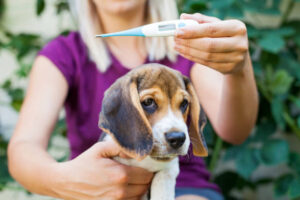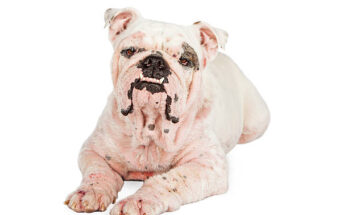As a loyal dog owner for over a decade, I’ve encountered my fair share of scares and emergencies with my beloved furry companions.
One of the most distressing situations any pet parent can face is the possibility of their dog ingesting something toxic.
While immediate veterinary attention is crucial in such cases, there are steps you can take at home to help mitigate the situation before professional help arrives.
10 Best Ways to Start Your Dog Poisoning Treatment at Home – Don’t Be Late
- Stay Calm and Assess the Situation:
Panicking won’t help anyone, especially not your dog. Take a deep breath, assess the situation, and try to determine what your dog has ingested.
Look for clues like chewed-up packaging, spilled substances, or any other unusual behavior.
- Reach out to your veterinarian or contact Animal Poison Control.:
In cases of poisoning, acting quickly is crucial.
If your dog has eaten harmful foods you can contact the animal poisoning controller.
They can guide you based on your particular circumstances.
- Collect Information:
While waiting for professional advice, gather as much information as you can about the suspected toxin.
This includes the name of the substance, the amount ingested (if known), and the time of ingestion.
This information will be valuable for your veterinarian to determine the best course of action.
- Induce Vomiting (Only if Instructed):
In some cases, inducing vomiting may be recommended by your veterinarian or poison control.
However, this should only be done under their guidance, as inducing vomiting can be dangerous if done incorrectly or if certain substances have been ingested.
- Administer Activated Charcoal (If Advised):
Activated charcoal aids in absorbing toxins in the stomach, preventing their absorption into the bloodstream.
Also Read ,
- Are Fluffy French Bulldogs Healthy? A Complete Guide 2024
- Merle French Bulldog Health Issues and Solution
Again, only administer activated charcoal if instructed to do so by a veterinarian or poison control.
- Keep Your Dog Comfortable:
While waiting for professional help, keep your dog comfortable and monitor their symptoms closely. Provide fresh water and a quiet, calm environment to help reduce stress.
- Do Not Attempt Home Remedies Without Guidance:
It’s essential to resist the urge to try home remedies or treatments without professional guidance.
Some common remedies found online can be ineffective or even harmful to your dog.
- Prevention is Key:
The best way to deal with poisoning is to prevent it from happening in the first place.
Keep toxic substances out of reach, including household cleaners, medications, plants, and certain human foods.
Be vigilant when walking your dog outside, as they may encounter toxins like pesticides or poisonous plants.
- Know the Signs of Poisoning:
Familiarize yourself with the common signs of dog poisoning, including vomiting, diarrhea, lethargy, difficulty breathing, seizures, and unusual behavior.
Early recognition can lead to faster treatment and a better outcome.
- Follow Up with Your Veterinarian:
Even if your dog appears to recover from a poisoning incident, it’s crucial to follow up with your veterinarian.
Some toxins can cause delayed or long-term effects, and your vet can provide further guidance on monitoring your dog’s health.
Here are some FAQs regarding Your Dog Poisoning Treatment at Home
- What are common household items that are toxic to dogs?
– Common household items toxic to dogs include certain foods (like chocolate, grapes, and onions), medications (such as ibuprofen and acetaminophen), household cleaners, pesticides, plants (like lilies and philodendrons), and even some types of chewing gum (containing xylitol).
- How do I know if my dog has been poisoned?
– Signs of poisoning in dogs can vary depending on the toxin ingested but may include vomiting, diarrhea, lethargy, difficulty breathing, seizures, drooling, loss of appetite, and unusual behavior.
If you believe your dog has been poisoned, get in touch with your veterinarian right away.
- Can I induce vomiting in my dog at home?
– Inducing vomiting in your dog should only be done under the guidance of a veterinarian or animal poison control.
In some cases, inducing vomiting can be harmful, especially if certain substances have been ingested, so it’s crucial to seek professional advice before attempting to induce vomiting at home.
- Should I administer activated charcoal to my dog if they’ve been poisoned?
– Activated charcoal assists in absorbing toxins in the stomach, preventing their absorption into the bloodstream.
However, it should only be administered under the guidance of a veterinarian or poison control, as the dosage and timing are critical factors in its effectiveness.
- What should I do if my dog ingests something toxic while I’m away from home?
– If you suspect your dog has ingested something toxic while you’re away, immediately contact your veterinarian or an animal poison control hotline.
They can guide you over the phone and advise you on the best course of action until you can get your dog to a veterinary clinic.
- Can I use home remedies to treat my dog’s poisoning?
– It’s essential to resist the urge to try home remedies without professional guidance, as some common remedies found online can be ineffective or even harmful to your dog.
Always consult with your veterinarian or poison control before attempting any home treatments.
- How can I prevent my dog from being poisoned in the future?
– Prevention is key to keeping your dog safe from poisoning. Keep toxic substances out of reach, including household cleaners, medications, plants, and certain human foods.
Be vigilant when walking your dog outside, and familiarize yourself with common toxins in your home and surrounding environment.
- What should I do if my dog appears to recover from poisoning?
– Even if your dog appears to recover from a poisoning incident, it’s crucial to follow up with your veterinarian.
Some toxins can cause delayed or long-term effects, and your vet can provide further guidance on monitoring your dog’s health and any necessary follow-up care.
Conclusion
While dealing with a poisoning incident can be frightening, staying calm and taking prompt action can greatly improve your dog’s chances of a full recovery.
Always prioritize your dog’s safety and well-being, and never hesitate to seek professional help.
By being prepared and proactive, you can be your dog’s best advocate in times of crisis.
Also Read ,





One Comment on “10 Best Ways to Your Dog Poisoning Treatment at Home”